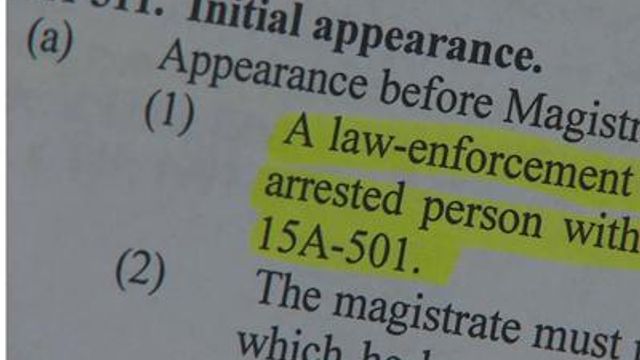Magistrate: Trooper followed procedure by not releasing woman
A state trooper accused of intimidating a Raleigh woman last month in Wilmington was following state law when he didn't release her after two tests showed she hadn't been drinking, a local magistrate says.
Posted — UpdatedPart of Gina Tessener's allegation is that Senior Trooper Edward Wyrick pulled her over last month, arrested her and took her to the Wrightsville Beach Police Department, where she registered a 0.00 on two separate breath-alcohol tests.
Afterward, Wyrick took her to the New Hanover County Detention Center, where she appeared before a magistrate.
Although he cannot comment specifically on what happened in Tessener's case, Wake County Chief Magistrate Dexter Williams said it appears that Wyrick followed proper procedure.
Although Tessener denied drinking, Wyrick reported that she had a "moderate odor of alcohol," which gave him probable cause to put her under arrest.
Under North Carolina law, once a law enforcement officer makes a warrantless arrest, such as a driving while impaired charge, he or she has to take the suspect before a judicial official for a probable cause hearing.
"I think most people think, 'Oh, the person blew 0.00. The officer can't take them any place else. They have to let them go,'" Williams said. "But the officer's not allowed to let them go. The officer has to follow the statute and fulfill the obligation for that."
Williams said, however, that state law does allow law enforcement officers to give "pre-arrest" tests to help them establishing probable cause.
"You can actually request a pre-arrest test," he said, "and the officer has to stop what he or she is doing and has to give them the option of getting a pre-arrest test."
That could then prevent a person from having to go before a magistrate.
"If I knew I wasn't going to blow anything, and I didn't want to get charged, I didn't want to go through all the process, then I may decide to ask for a pre-arrest test," he said.
Very few people, however, know about that provision in the law.
Tessener said she refused a field sobriety test because she didn't trust Wyrick after he said he smelled alcohol and that she wanted a witness present for the test.
Tessener also said that, during her hearing with the magistrate, the judge lectured her about "what she did wrong," even though he was about to sign her release, and told her she better not cross him again.
Williams said that a magistrate has discretion as to what to say to a person standing before him or her.
If that person registered a 0.00 blood-alcohol concentration and there was no other evidence of impairment, Williams said he would have likely released the person without comment.
Wyrick and another trooper, Andrew Smith, are on administrative duty while the Highway Patrol looks into the allegations.
It's unclear when the agency will complete its investigation.
• Credits
Copyright 2024 by Capitol Broadcasting Company. All rights reserved. This material may not be published, broadcast, rewritten or redistributed.





